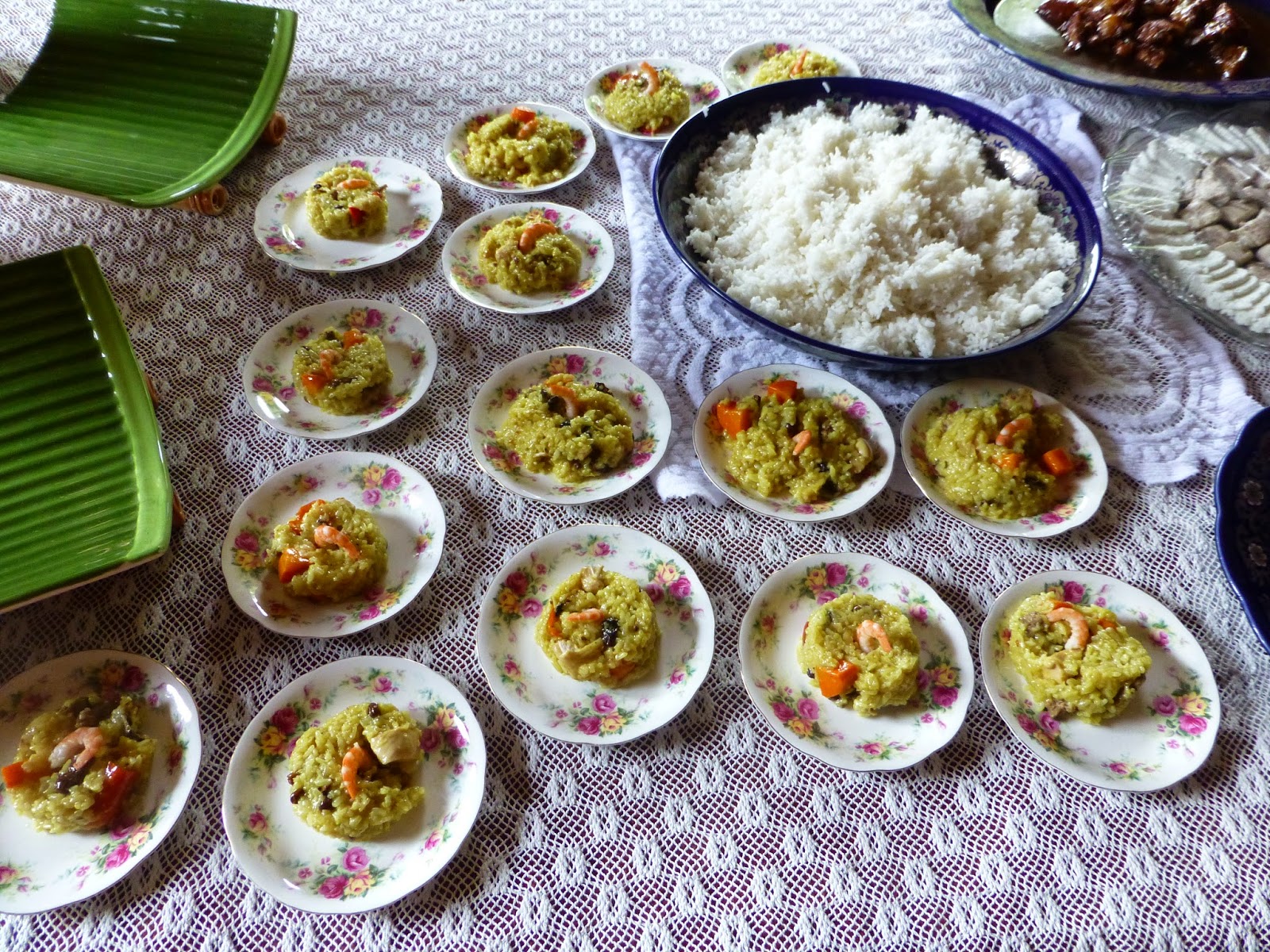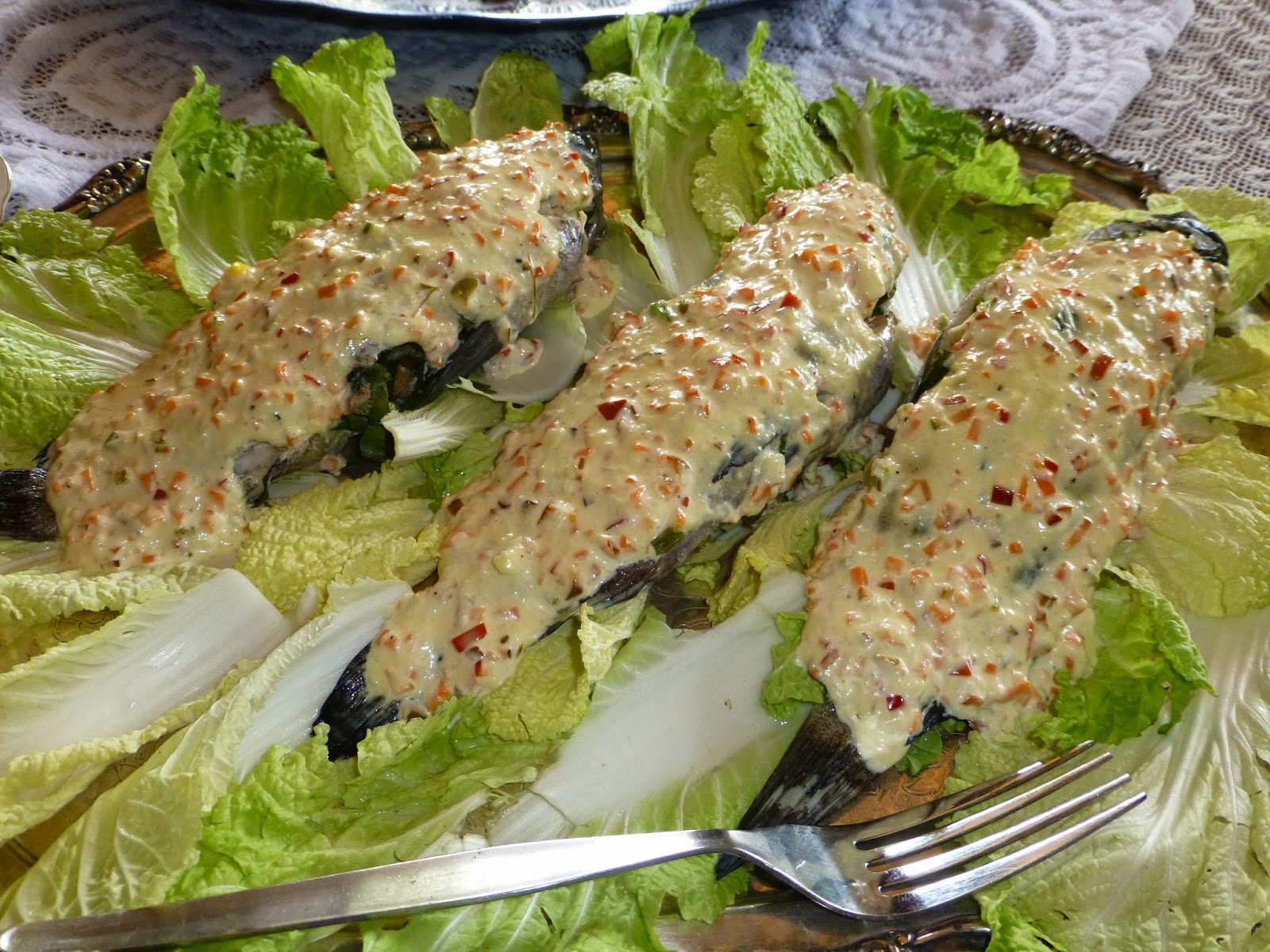A smashing
success of a food tour. This is CHOP's third food tour of the year, and we went
to Bulacan (Bulakan and Malolos), and learned a lot about (and tasted) their
amazing cuisine and its history.
Our
heartfelt thanks to our amazing Bulakenya (and CHOP member) Rheeza Hernandez
and her team (Roly Marcelino, Bing Tubid, Marichell Santos, Rapsody Magbanua,
Rheeza's hubby Jonathan Hernandez, Naty Ocampo-Castro, Boyet & Nina
Enriquez, Sir Dez Bautista, and Makata Jeremy Lord Mercado Dancil) for making
the tour such a success. We visited three ancestral homes, where they still
make their katutubong ulam at kakanin the good old-fashioned way -- the
Enriquez Ancestral House in Bulakan, the House of Don Antonio Bautista in
Malolos, and the Uitangcoy-Santos Ancestral House in Malolos.
(Rheeza
donated to CHOP a copy of her Tita Mila's out-of-print cookbook, "Ang
Kasaysayan ng Kaluto ng Bayan," by Milagros S. Enriquez, a treasure trove
of the history and recipes of native Bulacan cuisine from before, during, and
after the Phil. revolution. Thanks, Rheeza!)
CHOP - BULACAN FOOD TOUR
(Wednesday,
April 9, 2014)
This food
tour is CHOP’s third sponsored event for 2014, organized by Regina Newport in
collaboration with proud Bulakeña and CHOP member Rheeza Hernandez. Rheeza not
only coordinated the tour with Roly Marcelino of the Malolos City Tourism
Office, she also single-handedly demonstrated the cooking of such Bulacan
heritage dishes as Hamon Bulakenya, Pinaso and Gorgorya (more on these later).
Enriquez Ancestral House. The group’s first stop was the
Enriquez Ancestral House (in Bulacan, Bulacan) of acclaimed Filipino food
historian Milagros Santiago-Enriquez (Rheeza’s aunt), the author of the
historical cookbook, “Kasaysayan ng Kaluto ng Bayan,” which documents the
history of Bulacan cuisine from as early as the 17th century, and
provides original recipes of Bulacan dishes during the Philippine Revolution
and the birth of the Philippine Republic (Mrs. Enriquez was related to local
heroes Gregorio del Pilar and Pio Valenzuela). Her father-in-law, Col .Vicente
Y. Enriquez, was the aide-de-camp of Gen. Gregorio del Pilar.
“Putungan.” The tour started promptly at 9:00
a.m. in the lovely garden, where the group was treated to a surprise staging of
a “Putungan” or “Koronasyon” by Makata
Jeremy Lord Mercado, who chose CHOP member Vicky Yu as his muse and lucky
recipient of his narrated love poem. This was followed by a welcome speech by
our tour guide, Roly Marcelino, who acknowledged each member of the group by
name and, as applicable, by professional background.
Cooking Demo. Rheeza proceeded to demonstrate
how to make what Bulakeños proudly claim as the best-tasting ham ever, the
Hamon Bulakeña, which is a slab of pork belly marinated, then slow-cooked, in a
special sauce until it’s fork-tender but still firm (to keep its shape). The cooked
meat is coated in white sugar, then scorched with a very very hot cast-iron
turner (siyanse) to caramelize the sugar (the turner/siyanse had been sitting
in live coal for hours, and the sugar burst into flames as soon as the siyanse
touched it (pushing quite high the “wow” factor of the demo). Rheeza regaled
the group with her very interesting anecdotes about her own experiences in Bulacan’s
culinary world, which amazingly did not distract her at all from the cooking tasks
at hand. The ham was sliced and served as a sandwich using “bowling bread,”
which is the local version of pan de sal, and Kalumata Tea (kalumata is a local
plant with anise-flavored leaves). Needless to say, the ham was so delicious that
everyone asked for the recipe.
House Tour. Before leaving, the group was
given a guided tour of the house, which is now a museum of rare antiques and
historical artifacts.
Bautista Mansion. Everyone was looking forward to
our next stop, the Bautista Mansion in Malolos, built in 1877 but is now the
current home of food historian and Professor Dez Bautista, who inherited it
from parents José and Norma. Mr.
Bautista founded the Production Designers Guild of the Philippines (PDGP). Like
the Enriquez Ancestral House, the Bautista Mansion played an important role in
the Philippine Revolution—it had hosted no less than our National Hero, Dr. Jose
Rizal. The Mansion houses a valuable collection of historical artifacts and
original artworks of artists like Amorsolo, Hidalgo and Guerrero.
Mr.
Bautista throws parties for friends for whom he cooks up old Bulacan recipes,
which he calls “period meals.” He learned to prepare them from his family’s
treasured recipes. He gave an engaging talk about the history of both the house
and Bulacan cuisine, especially those that would be served at our lunch. The
group happily feasted on such dishes as Suam na Mais, Kinilaw na Bangus na may
Kesong Puti, Bringhe, Baboy na Luto sa Toyo, Lumpiang Kastila, Pescado a la
Reyna, Leche Flan de Manga, and Melon Tagalog.
“Empanada de Kaliskis.” A tour of the house followed the
sumptuous meal, after which the group proceeded to the third stop, the home of
Bulacan’s famed “Empanada de Kaliskis.” The group watched as Tita Mercy Antonio
and Tita Tess Luriaga demonstrated how to make these scrumptious chicken and
vegetable empanadas (although we were not shown how the dough was made and how
it turned into many layers of flaky and crusty skin after frying—the recipe has
been kept a secret and has stayed within the family). After a tasting of the cooked empanadas,
everyone put in an order, to be picked up on our way home at the end of the
tour. We learned that Tita Mercy’s family had been making these empanadas since
the Spanish colonial times and, at 74, she still makes them every single day. Amazing.
Alberta Uitangcoy-Santos House. The fourth and last stop on our
itinerary was yet another ancestral house, the Alberta Uitangcoy-Santos House,
also in Malolos. The original house, which was built in the 1890s, was
destroyed by fire in the 1910’s, and reconstructed in 1914. Alberta
Uitangcoy-Santos (1865-1953) was one of the leaders of the famous Women of
Malolos, to whom Jose Rizal wrote his famous letter in 1889 commending the
group of 20 young women who bravely petitioned the Spanish Governor General (Valeriano
Weyler) at the time to allow them to open a night school where they could learn
the Spanish language. The house is now the Museum of the Women of Malolos. Malolos
is celebrating the 125th year of the Petition Letter of the Women of Malolos
(December 12, 1888) and the 125th year of the Letter of Rizal to the
Women of Malolos (February 22, 1889).
Another Cooking Demo. Rheeza was back into cooking demo
mode, and she proceeded to show the group how to make—from scratch—Gorgorya, one
of the three of Bulacan’s most popular egg-and-flour-based biscuits/cookies; the
other two are Pilipit and Kurbata de Sebo. She also demonstrated the making of
Pinaso, another Bulacan specialty dessert dish which is a cross between leche
flan and crème brûlée, and is called Pinaso (scorched in English) because the
sugar-coated surface of the finished dish is scorched or caramelized with a
very hot iron turner (siyanse), much like the method used for the Hamon
Bulakeña. (Pinaso is one example of “Hello Joe Recipe” dishes cooked in the
early days using GI Goods or PX Goods.)
Rheeza
explained that during the colonial period when the friars were building
churches, egg whites were used to bind together the rocks, corals and shells
that were used in the construction. This resulted in a surplus of egg yolks,
which led the womenfolk to find ways of cooking them into egg-based desserts
such as gorgorya, kurbata de sebo, pinaso, leche flan, and yema, among others.
Once again, Rheeza delighted the group by punctuating her cooking demo with
very amusing anecdotes.
“Pabalat" or "Borlas” – Pastillas Wrappers. Ms. Naty Ocampo-Castro
demonstrated the cutting of intricate patterns on Japanese paper used for
wrapping the pastillas candies, which is called pabalat or borlas. They make
the San Miguel Bulacan version where a pattern of the design is traced then cut
out. The one Rheeza showed the group in frame was the Malolos-style cutting,
more inticate and cut spontaneously without using a pattern. They also have two
versions of the pastillas--the white is pastillas de leche and the other,
pastillas tostado.
Bonus Merienda. After Rheeza’s cooking demo and
merienda-tasting, as the group toured the historical house, we were informed
that the generous owner [Corina
Tengco-Bautista] of the huge house across the street, who knew some members
of the group, was inviting us for another helping of merienda! So we trooped
across the street, to find various Filipino kakanin and drinks laid out on the
dining table—puto, sapin-sapin, suman, ginataan, galapong in two types of
sauce, etc. Despite having already had a full merienda, we somehow managed to
find space in our tummies for these delicious Filipino dishes.
On the
way home, we made a quick visit to the Barasaoin Church before picking up our
pasalubongs of Empanada de Kaliskis, Gorgorya, and Kurbata de Sebo. Everyone
went away happy and with extremely full tummies—it was a day of fun, food tasting,
and learning about the cuisine of Bulacan.
CHOP
thanks Rheeza Hernandez and her team for making this food tour a huge
success: Roly Marcelino, Bing Tubid,
Marichelle Bernardo, Rapsody Magbanua, Rheeza's hubby Jonathan Hernandez, Naty
Ocampo-Castro, Tita Mercy Antonio and Tita Tess Luriaga, Boyet & Nina
Enriquez, Sir Dez Bautista, and Makata Jeremy Lord Mercado Dancil.
[Note: The recipes and photographs from this food
tour will be part of this narrative for CHOP’s archives.]
Regina Newport, April 2014
BULACAN FOOD TOUR - PROGRAM & MENU
by: Roly Marcelino , Malolos City Tourism Office
FIRST STOP:
8:00 am to 10:00 am
Pamanang Kaluto ng Bayan ni Milagros S. Enriquez
Enriquez Ancestral House Bulacan,
Bulacan
(Ancestral House of the late Food
Historian Milagros Enriquez)
Cooking Demo and Food Tasting: Hamon Bulakenya
with Bowling Bread and
Kalumata Tea
SECOND STOP:
10:00 am to 12:00 noon
Historical Food Stories by Mr. Dez Bautista
Bautista Mansion, Malolos City
(House of Don Antonio Bautista)
Lunch:
Suam na Mais
Kinilaw na Bangus na may
Kesong Puti
Bringhe
Baboy na Luto sa Toyo
Lumpyang Kastila
Pescado ala Reyna
Leche Flan de Manga
Melon Tagalog
THIRD STOP:
1:00 pm to 2:00pm
The Culinary Legacy of the Women of Malolos
Women of Malolos Museum
Alberta Uitangcoy-Santos Ancestral
House, Malolos City
Merienda:
Pinaso (glazed pudding made from soda crackers) [*cooking demo]
Gorgoria (sugar
coated shell-shaped native cookies) [*cooking demo]
Empanada de Kaliskis (
chicken filled turn-over pies)
Corbata / Biscocho de
Sebo ( traditional Bulacan biscuit)
Kalumata Tea (Kaluta is
an aromatic leaf used to flavor teas, soup and other desserts)
Cooking Demos: Pinaso
and Gorgoria
Demo: How to make
Pastillas Wrappers
* * *
Ige Ramos' "Bandehado" columns in PDI's BANDERA Series
Photo Gallery










































































No comments:
Post a Comment